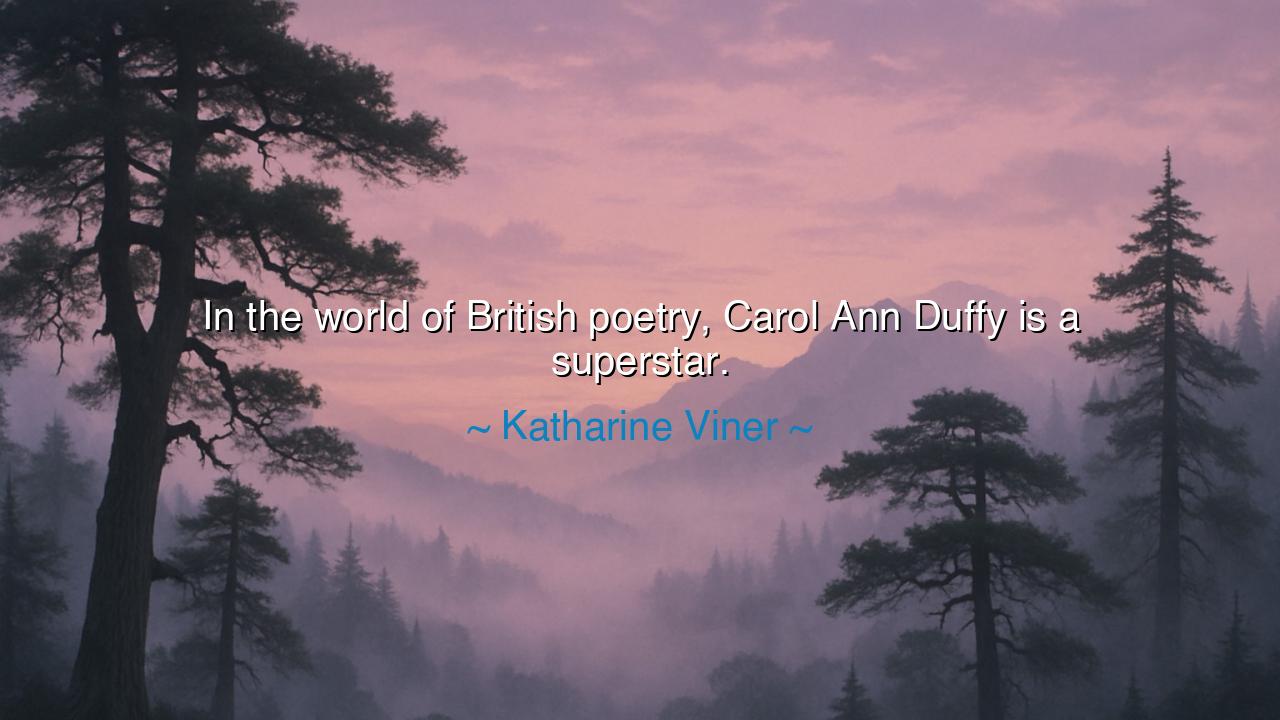
In the world of British poetry, Carol Ann Duffy is a superstar.






“In the world of British poetry, Carol Ann Duffy is a superstar.” Thus declared Katharine Viner, editor and critic, capturing in one bold phrase the luminous stature of a poet who has risen from the quiet labor of verse to the shining stage of cultural renown. These words are not idle praise; they reveal the rare moment when a poet, usually hidden in the shadows of libraries and classrooms, steps into the full light of public recognition and becomes a beacon for her time.
The meaning of this saying lies in the marriage of two worlds: the intimate world of poetry, often private and contemplative, and the public world of fame and influence. To call Duffy a superstar is to say that her words transcend the page; they enter into the lives of multitudes, becoming not only literature but shared experience. A superstar is one whose light reaches far, and in Duffy’s case, it is not by spectacle or performance, but by the sheer clarity, sharpness, and humanity of her verse.
The origin of this claim lies in Duffy’s historic role as the first woman Poet Laureate of the United Kingdom, a post once reserved for voices shaped by tradition, patriarchy, and a narrower vision of culture. With her appointment, she broke barriers, not by abandoning tradition but by reshaping it in her own image—writing with wit, compassion, and accessibility. Viner’s words capture this cultural moment, when the world of poetry found itself speaking through a woman who belonged not only to the academy but to the people.
History offers echoes of this phenomenon. In ancient Greece, Sappho was revered not just as a poet but as a cultural force whose songs carried across generations. In the Renaissance, Shakespeare rose from playwright to near-mythic figure, his words becoming the common inheritance of England. Duffy belongs to this lineage: a poet whose voice has become so central that she is not merely a writer but a symbol, embodying the power of verse to reflect and shape a nation’s identity.
The lesson here is that poetry, though often thought of as niche or obscure, has the power to lift individuals into cultural prominence when it speaks with authenticity to the needs of the age. Duffy’s themes—love, gender, power, memory—resonate widely because they touch the deepest fibers of human experience. A poet becomes a superstar not by chasing fame, but by staying true to the craft until the world can no longer ignore the brilliance of the light.
Practically, this means that those who write, create, or labor in obscurity should not despise the smallness of their beginnings. The world of art is slow to grant its laurels, yet persistence, authenticity, and courage may one day lead to recognition beyond imagining. For readers, it means we should not wait until artists are crowned by institutions to honor them—seek out the voices of your own time, support them, and let their words illuminate your own journey.
Thus the teaching endures: in the realm of British poetry, Carol Ann Duffy stands as a superstar, not because she pursued celebrity, but because her words carried the strength to touch both the private soul and the public heart. Katharine Viner reminds us that poetry, far from dying in obscurity, can still create figures of radiant influence. Let us then honor such voices, for they are not only poets but stars—guiding lights for the generations who follow.






NNNho Nguyen
I think Viner’s characterization of Carol Ann Duffy as a 'superstar' is not only a recognition of her literary talent but also her ability to connect with audiences in a meaningful way. However, I’m curious about the pressures that come with such fame in the literary world. Does being considered a 'superstar' impact Duffy’s creative process or the way her work is perceived? How do we balance the artistry of poetry with the commercial aspects of fame?
QVvu quoc viet
I like the idea of Carol Ann Duffy being a 'superstar' in British poetry, as it acknowledges her widespread influence and reach. But I wonder—what does it take for a poet to truly achieve this level of fame? Duffy’s poetry often touches on universal themes, but how much of her success is tied to the timing of her work and the context in which she writes? Could another poet writing similar themes have achieved the same level of recognition?
XKLe Xuan Khanh
Viner’s comment about Carol Ann Duffy being a 'superstar' in British poetry brings up an interesting point about how certain poets achieve widespread recognition. Duffy’s work is well-known and often taught in schools, but does this level of fame sometimes overshadow the deeper nuances of her poetry? Is there a risk that her popularity makes her work seem more mainstream or less appreciated in more literary circles?
TTThanh Trinh Thi Thu
I agree with Viner that Carol Ann Duffy has become a significant figure in British poetry. Her ability to blend accessibility with profound emotional depth has made her widely celebrated. But I’m curious—what makes her stand out as a 'superstar' in the poetry world? Is it the way her work resonates with the public, or is it her innovative use of language and form that sets her apart from other poets?
UGUser Google
I find Katharine Viner’s description of Carol Ann Duffy as a 'superstar' in British poetry quite fitting. Duffy’s work has reached such a wide audience and covers a range of themes from personal experiences to social issues. But I wonder—does her mainstream recognition as a 'superstar' change how her poetry is received by critics and readers? Does fame bring a certain level of expectation, or is her success simply a testament to her talent?